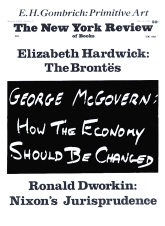To the Editors:
The predictable character of the post-civil war Nigerian polity is now becoming clear. As some of us concluded at the time, the defeat of Biafra could not be construed as a victory for the Nigerian people, but for the great powers who intervened on the side of the Federal government, and for the domestic military and civilian upper classes. The new “new” Nigeria is a classic example of a nominally independent neo-colonial society, and that, of course, has very serious implications for the future of black Africa.
For example, a recent half-page ad in the financial section of the New York Times, placed for the second time by the Electricity Corporation of Nigeria, which bills itself as Africa’s fastest growing electrical industry, makes the following pitch to American businessmen: “People are earning huge profits in Nigeria, why don’t you?” Among the detailed reasons listed for this unusual opportunity are: “Pioneer industry enjoys substantial amenities”; “It is possible to get your investment back in less than three years.” What this implies for ordinary Nigerians is bluntly stated: “Abundant man power is available at a rate as low as seven United States cents per man hour.”
A further and more political sign of conditions in post-civil war Nigeria is the letter of protest which has been forwarded to the head of the military government, Major General Gowan, by the Western Nigeria States Students’ Union of Great Britain and Ireland. The union directly represents students from the Western area of Nigeria, primarily, but not exclusively, Yoruba in ethnic origin. The opinion of this group, which is the largest student union of its kind in the country, is taken very seriously in Nigerian circles, since it is from such students that future civilian intellectual leadership is bound to be drawn. Moreover the predominantly Yoruba-speaking peoples of the West and the predominantly Hausa-speaking peoples of the Moslem-dominated North had united behind the military government in the attack on Biafra.
Thus, the opinions expressed in the letter to Gowan, which are said to reflect “the frustrations and…opinions of the people of…Western…Nigeria,” are of great importance. In outlining “the awful situation now prevalant in the whole Federation of Nigeria, and in particular, in the Western state,” the letter begins by asserting that after the six years of rule following the countercoup that installed Gowan as Chief of State, conditions are no better than they had been under the admittedly corrupt civilian regime which had become Nigeria’s first independent republic.
Addressing itself directly to General Gowan, the letter charges in part that:
- Despite his promise, he has failed to hand over the government of the Federation to the civilian custodians he himself had named, and has decreed that the army will remain in power until 1976: But “there is no indication that you will relinquish power at that time.”
- In order to obtain the support of the peoples of Western Nigeria in the war against Biafra, he had promised that administrative posts would be shared equally between the North, West, and other parts of the country. However, there is now “Northern preponderance in the top posts of your government.”
-
The Federal (largely Northern) army which has occupied the Western state since before the civil war, an occupation initiated by the Northern-dominated republic in response to severe disturbances in the West, threatening hegemony, has been enlarged and consolidated.
-
Leading politicians in the Western state have been detained and are still being held without trial, while essential Federal institutions and resources have been gradually and systematically transferred to the North.
The letter also charges that the deliberate policy of the Northern-dominated government is to set Easterners against Westerners; and this is furthered by Hausa propaganda that it was the Yorubas who incited the Federal government to wage the civil war against Biafra.
Unemployment, the letter points out, has been increasing throughout the Federation since Gowan became Chief of State; but this is most notable in the Western areas because the regime has been favoring the North with new industry. At the same time Hausa, the lingua franca of the North, has been introduced into the curriculum of schools in the Midwest state as a prelude to its ultimate adoption as the official Nigerian language.
The letter concludes with a series of demands that are in effect remedies for these complaints:
First, the question of a national language is fundamental to basic human rights; the people of the East and West must be given the opportunity to decide if they prefer Hausa as their official language. A country-wide referendum is out of the question because the North, having a majority of the population, at least according to the disputed census returns, would obviously vote for its adoption.
Second, the real source of bribery and corruption in Nigeria today is within the top Hausa hierarchy; this hierarchy must be changed. At the same time all the remaining senior managers who are foreigners must be replaced by able Nigerians if the regime “genuinely believes in the emancipation of the black man.”
The document, which I have only partially summarized here, is signed by Rayo Atannagbowo (Secretary) and S. K. Ogunturnrin (President) of the Western Nigeria States Students’ Union of Great Britain and Ireland. Their last word is that unless Gowan meets their demands, he will “be responsible for the consequences which may follow.”
Stanley Diamond
New School for Social Research
New York City
This Issue
May 4, 1972



